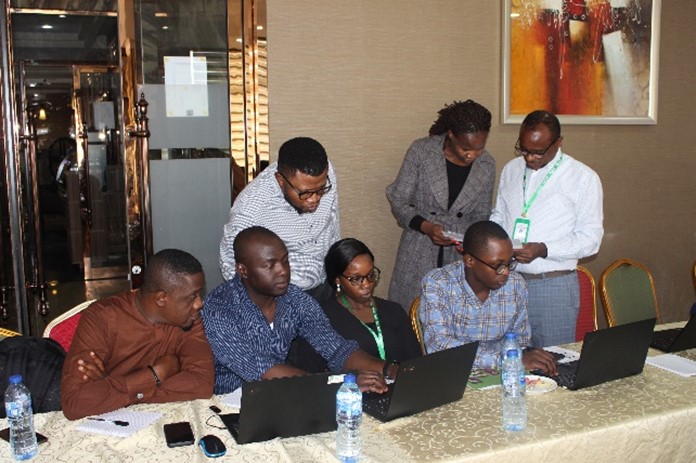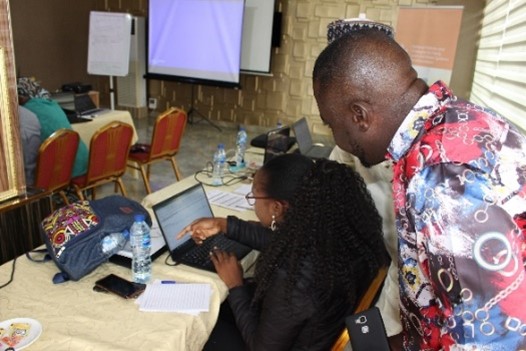
Photo credit: Omobolanle Onilogbo/IFPRI
On September 5, 2022, the International Food Policy Research Institute (IFPRI) kicked off a four-day “Building a Nigerian Social Accounting Matrices (SAM)” training as part of a series of Nigeria Capacity Sharing Workshops Series under the CGIAR National Policies and Strategies for Food, Land and Water Systems Transformation (NPS) Initiative[1], and Foresight &Metrics initiative.
The training followed the previous social accounting matrix (SAM) introduction on July 7, 2022, and included 25 participants from key stakeholders involved in Nigeria’s NPS activities. These include the National Bureau of Statistics (NBS), the Nigerian Governors Forum (NGF), the State Ministry of Agriculture, the Nigerian Institute of Social and Economic Research (NISER) – and researchers from the IFPRI offices in Nigeria and Kenya. Lensa Omune, Research Officer based at IFPRI Kenya, led the training sessions. Kwaw Andam, Nigeria NPS Lead and Country Program Leader of IFPRI-Nigeria, Temilolu Bamiwuye and Chibuzo Nwagboso, Research Analysts at IFPRI-Nigeria, facilitated the training session.

Photo credit: Onilogbo Omobolanle/IFPRI
The training aimed to further introduce and share capacity with relevant government institutions and NPS partners on using the SAM as a comprehensive national accounting database for economywide analysis and policy prioritization. SAM concepts, how it is built using Nexus SAM toolkit, and its use in economywide analysis for investments and policies priority setting was unpacked.
Kwaw Andam and Lensa Omune welcomed participants to the four-day training, along with greetings from the representatives of NBS and NISER. The training then proceeded to introduce the SAM concepts, the need for economywide analysis and the role of SAM as a statistical database for policy analysis.
Participants were introduced to IFPRI’s Nexus SAM Toolkit, a standardized approach to building SAM. The trainees were guided through the toolkit, starting from the structure and properties of SAM and the data sources required to build SAM. Building processes for the Nexus SAM were explained, including building a Macro SAM (a disaggregated SAM), unpacking Supply and Use Tables (SUTs) by Nexus SAM sector classification for breaking down activities and commodities accounts, disaggregation of household and labour accounts using household survey data, and regional SAM. Participants went through an exercise for building a Ghana Macro-SAM and a Nigeria Macro-SAM to reinforce their understanding of how to build a macro-SAM. More exercises and discussions were conducted on key statistics derived from SAM and basic multiplier analysis.
Concluding the group work on the final day, participants learnt how to collect household income distribution data and create income distribution and generation matrices as well as household consumption matrices. In addition, the participants finalized discussions around the exercises done during the training sessions.
The training ended with a post-test to measure the amount of knowledge gained. The result of the post-test showed an overall increase in knowledge. The participants expressed satisfaction with the quality of the training and the many opportunities for collaboration among the organizations present at the training (NBS, NGF, NISER, IFPRI) to build a robust nationwide SAM for Nigeria and use it in guiding and supporting government policy decisions.
IFPRI will conduct further engagements and trainings to selected participants who will serve as SAM experts and influencers in Nigeria, breaking down the tool at the state level, ensuring all states are carried along and championing its use for comprehensive policy analysis to examine the coherence and trade-offs between policies and investments.
Participants during the NPS Nigeria 4-day capacity sharing session on Building a Nigeria Social Accounting Matrix (SAM).
Photo credit: Omobolanle Onilogbo/IFPRI
Read about previous NPS SAM training.
Read about the Nigeria NPS launch.
[1] This work is part of the CGIAR Research Initiatives on National Policies and Strategies (NPS). CGIAR launched NPS with national and international partners to build policy coherence, respond to policy demands and crises, and integrate policy tools at national and subnational levels in six countries in Africa, Asia, and Latin America. CGIAR centers participating in NPS are The Alliance of Bioversity International and the International Center for Tropical Agriculture (Alliance Bioversity-CIAT), International Food Policy Research Institute (IFPRI), International Livestock Research Institute (ILRI), International Water Management Institute (IWMI), International Potato Center (CIP), International Institute of Tropical Agriculture (IITA), and WorldFish. We would like to thank all funders who supported this research through their contributions to the CGIAR Trust Fund.



